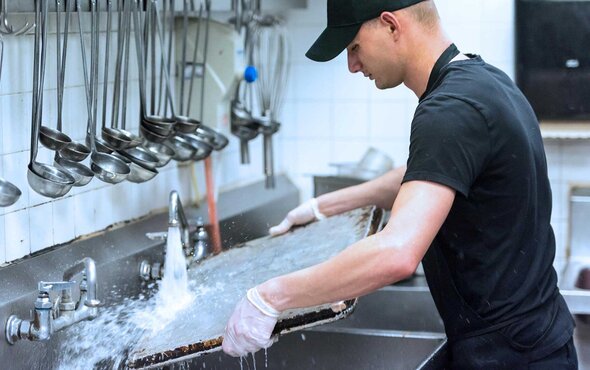PROFESSIONAL KITCHEN PLANNING
When experienced specialists plan a kitchen for a restaurant, café, bar or catering company, they first determine what space is needed: where will deliveries come to? And where will they be stored? Meat, fish, vegetables etc. have to be accommodated differently from drinks and dry food. What space will the cooking and dishwashing areas occupy? And, of course, storage rooms must be planned from the outset, keeping them separate from the actual kitchen, the staff areas, the office and, above all, the dishwashing area.
EFFICIENCY
in the dishwashing area
Workspaces in your restaurant, canteen or bistro should be divided in such a way as to facilitate efficient work processes, avoiding long or overlapping routes for staff. Of course, this must also include a strict separation of ‘clean’ and ‘unclean’ zones for hygiene reasons. It is equally important that, for example, kitchen staff quickly dispatch food to the serving staff and dirty pots return equally quickly to the dishwashing area – but without these zones overlapping.
It is interesting to note, however, that the majority of problems in commercial kitchens do not start at the cooker since, generally, several cooking areas are available, meaning the risk of everything failing is minimal. The dishwashing area, though, can often be a critical point. Sometimes plates, glasses and cutlery don't come out properly clean, sometimes the dishwashing machine simply stops working and sometimes it doesn't mesh properly in the system with the staff. Food-service businesses also suffer a disproportionately high incidence of absence, for which there are several reasons. One such reason might be the significant physical and mental strain of peak times, another that ergonomics was not properly considered when buying kitchen and dishwashing appliances.
The result is that employees call in sick at short notice, processes get mixed up and guests are unhappy because quality suffers.
CLEANLINESS AND HYGIENE ARE YOUR TRUMP CARDS
In order to avoid disruptions to smooth-running processes, hotel managers, chefs and restaurant managers opt for professional suppliers right from the planning phase. Experienced restaurateurs know that the dishwashing area in particular can cause pain in any restaurant. In food service and hotels, you need to reliably ensure that washware will be hygienically clean and available quickly. That is why many restaurant and hotel managers choose commercial dishwashing specialists like MEIKO for their commercial kitchens, right from the planning stage.
13 QUESTIONS TO ASK YOURSELF WHEN PLANNING YOUR COMMERCIAL KITCHEN:
- Are your kitchen planners sufficiently experienced?
- Can you plan the set-up so that individual areas can work closely together while remaining separate?
- Have you managed to comply with hygiene requirements?
- Are staff routes efficient while they are working?
- What volume is to go through the dishwashing machine on a daily basis?
- Do you have particular requirements for your washware? E.g. in terms of care
- How much time do you have available for each wash cycle? (Think about reserves of crockery/kitchenware)
- How are water, electricity and detergent managed? Are you protecting the company's bottom line?
- Can you wash large quantities of washware – including tall glasses – in a single work step?
- Will your commercial dishwashing machine keep the workspace largely free of steam so as not to pollute the indoor environment with mould growth?
- Is it easy and ergonomic to operate, safeguarding the health of your employees to avoid sick days?
- Does your kitchen equipment live up to the aesthetic standards of modern, professional kitchen equipment?
- Is the customer service team already on board with help and advice in the planning stage? And are you confident you will be able to reliably reach them in future?
UTILISE PROFESSIONALS' EXPERTISE
Making sure you plan for all of these points in your commercial kitchen is difficult to do by instinct. It is better to get a specialist in. Experienced kitchen planners know how to make optimum use of the available space, for example, to facilitate efficient processes and they know what appliances are really necessary for your individual circumstances. They also know how to account for important aspects like ergonomics in the workplace and, if necessary, provide information on the strict hygiene regulations for commercial kitchens (more information on this in the article: What is HACCP? And why does every restaurateur need it?)
Do you need help planning a new kitchen or dishwashing area for your restaurant, café, hotel or canteen?
Specialist advisers at MEIKO will be happy to talk to you and assist.



